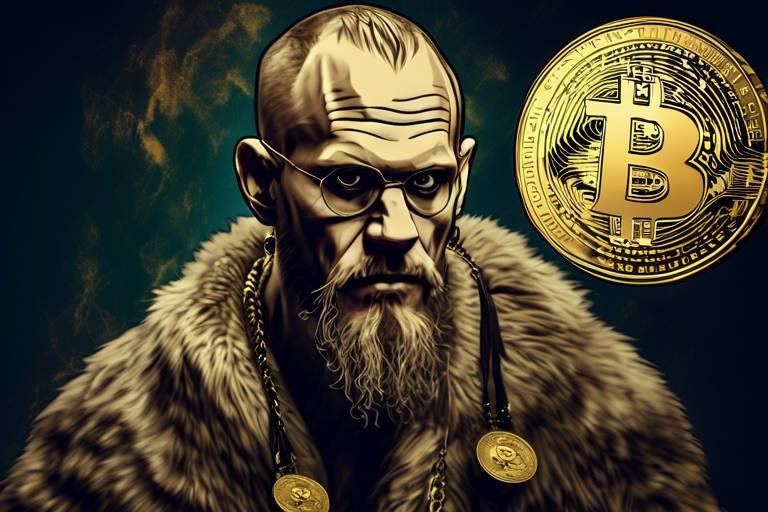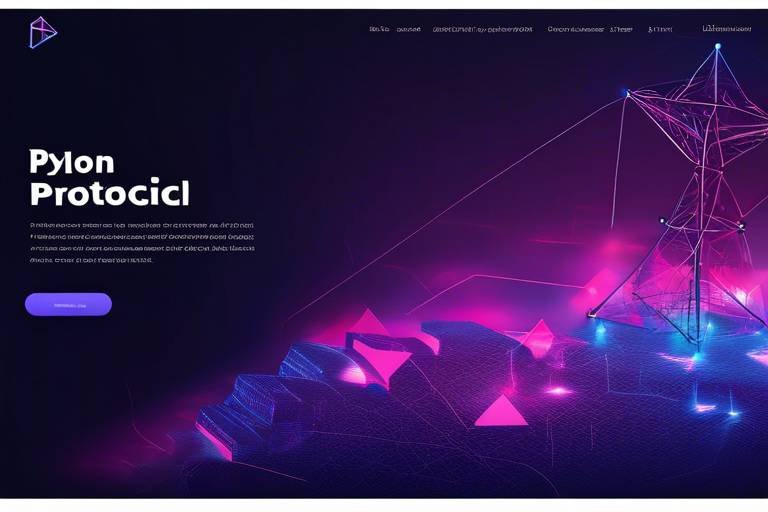Origin Protocol - Decentralizing E-Commerce
In today's digital age, the way we buy and sell products is undergoing a radical transformation. Enter Origin Protocol, a pioneering platform that is set to revolutionize the e-commerce landscape through the power of decentralization. Imagine a world where online transactions are not only secure but also transparent and user-empowered. That’s precisely what Origin Protocol aims to achieve. By leveraging blockchain technology, it eliminates the need for intermediaries, allowing consumers and sellers to interact directly. This innovation not only enhances trust but also fosters a more equitable market for everyone involved.
So, why is decentralization such a game-changer? Well, think of it this way: traditional e-commerce platforms often operate like a centralized hub, where a few powerful entities control the flow of transactions and data. This setup can lead to issues like high fees, lack of transparency, and even data breaches. In contrast, decentralization shifts power back to the individuals, creating a more democratic and open environment. Users can enjoy greater control over their data, lower transaction costs, and a more personalized shopping experience. The implications of this shift are profound, and Origin Protocol is at the forefront of this exciting evolution in the e-commerce sector.
At the heart of Origin Protocol lies its innovative technology, designed to facilitate decentralized marketplaces. By utilizing smart contracts, the platform automates and secures transactions, ensuring that agreements are honored without the need for a middleman. This not only speeds up the process but also significantly reduces costs associated with transaction fees. Furthermore, Origin Protocol incorporates token incentives that encourage user participation and loyalty, creating a vibrant ecosystem where both buyers and sellers can thrive.
As we delve deeper into the workings of Origin Protocol, you'll discover how its features not only enhance trust and efficiency but also pave the way for a future where e-commerce is more accessible and empowering for everyone. Are you ready to explore the future of online shopping? Let's dive in!

The Concept of Decentralization
Decentralization is more than just a buzzword; it's a transformative concept that reshapes how we think about power and control in various sectors, especially in e-commerce. At its core, decentralization involves shifting authority from a central governing body to individual users. Imagine a world where you don't have to rely on a single entity to validate your transactions or provide access to services. This shift fosters a more democratic environment, empowering individuals to take charge of their own transactions and interactions.
In traditional e-commerce, platforms like Amazon or eBay serve as intermediaries, controlling everything from payment processing to dispute resolution. However, with decentralization, the power dynamics change significantly. Users can engage directly with one another, eliminating the need for middlemen. This not only reduces costs but also enhances transparency and accountability. For instance, when you purchase an item from a decentralized marketplace, the transaction details are recorded on a blockchain, making it nearly impossible to alter or manipulate the information.
Moreover, decentralization promotes inclusivity. It opens the doors for small businesses and individual sellers who might struggle to compete on traditional platforms. By leveraging decentralized networks, these sellers can reach a global audience without the heavy fees often associated with established e-commerce giants. This creates a more level playing field where innovation and creativity can thrive.
However, the journey towards decentralization isn't without its challenges. Users may face a steep learning curve when navigating new platforms, and there are concerns about security and fraud. Yet, the benefits often outweigh these concerns. The potential for lower fees, increased privacy, and greater control over personal data makes decentralization an attractive option for consumers and sellers alike.
As we delve deeper into the realm of decentralized e-commerce, it's essential to understand that this movement is not just about technology. It's about reimagining relationships between consumers and sellers, fostering trust, and creating a marketplace where everyone has a voice. In the following sections, we'll explore how Origin Protocol embodies these principles and the innovative solutions it offers to revolutionize the e-commerce landscape.

Overview of Origin Protocol
Origin Protocol is a groundbreaking platform that aims to transform the way we think about e-commerce by leveraging the power of blockchain technology. In a world where traditional marketplaces often operate under a centralized model, Origin Protocol stands out by providing a decentralized framework that empowers users, enhances transparency, and fosters trust. Imagine a marketplace where you can buy and sell goods directly with others, without the need for intermediaries taking a cut of your hard-earned money. That’s the vision behind Origin Protocol.
At its core, Origin Protocol is designed to facilitate decentralized marketplaces, allowing users to engage in peer-to-peer transactions seamlessly. The platform utilizes smart contracts—self-executing contracts with the terms of the agreement directly written into code—to automate processes and ensure that transactions are executed securely and transparently. This means that once a transaction is initiated, it can’t be altered or tampered with, providing a level of security that traditional e-commerce platforms struggle to match.
Origin Protocol isn’t just about technology; it’s about creating a community. The platform encourages user participation through token incentives, which reward users for their engagement and contributions. By integrating these tokens into the ecosystem, Origin Protocol not only enhances user loyalty but also creates a vibrant marketplace where everyone has a stake in its success.
One of the standout features of Origin Protocol is its commitment to privacy. In traditional e-commerce, user data is often collected and sold without consent, leading to privacy concerns. However, Origin Protocol prioritizes user privacy, allowing individuals to control their own data and decide how it’s shared. This shift not only builds trust among users but also aligns with the growing demand for privacy-centric solutions in today’s digital landscape.
To summarize, Origin Protocol is not just another blockchain project; it's a revolutionary approach to e-commerce that seeks to dismantle the traditional barriers that have long existed in online marketplaces. By focusing on decentralization, transparency, and user empowerment, Origin Protocol is paving the way for a new era of e-commerce where everyone can thrive.

Key Features of Origin Protocol
Origin Protocol stands out in the crowded e-commerce landscape due to its innovative features designed to empower users and enhance transaction efficiency. At the heart of its offering are smart contracts and token incentives, which together create a robust framework for decentralized marketplaces. These features not only facilitate seamless transactions but also build a foundation of trust that is often lacking in traditional e-commerce platforms.
To delve deeper, let's first explore the role of smart contracts. Imagine a vending machine: you insert money, select your item, and the machine delivers it without any human intervention. Smart contracts function similarly in the digital realm; they are self-executing contracts with the terms of the agreement directly written into code. This automation significantly reduces the need for intermediaries, such as banks or payment processors, thus minimizing transaction costs and expediting the process. Furthermore, because these contracts are recorded on the blockchain, they provide an immutable record of the transaction, ensuring transparency and security.
In addition to smart contracts, Origin Protocol utilizes token incentives to foster user engagement and loyalty. By rewarding users with tokens for various activities—such as making purchases, providing feedback, or referring new users—Origin Protocol creates a vibrant ecosystem where participants are motivated to contribute. This token economy not only enhances user experience but also aligns the interests of buyers and sellers, creating a more cohesive marketplace. Users can think of these tokens as points in a loyalty program, which can be redeemed for discounts, exclusive offers, or even traded on exchanges, adding tangible value to their participation.
Moreover, the combination of smart contracts and token incentives leads to a reduction in fraud and disputes. In a traditional e-commerce setup, misunderstandings can often result in chargebacks and negative experiences for both buyers and sellers. However, with Origin Protocol's decentralized approach, the terms of the transaction are clear and enforced automatically, leaving little room for ambiguity. This clarity not only enhances trust among users but also encourages a more vibrant marketplace where participants feel secure in their transactions.
In summary, the key features of Origin Protocol—smart contracts and token incentives—work in harmony to create a decentralized e-commerce environment that is more transparent, efficient, and user-friendly. By leveraging these innovative technologies, Origin Protocol is paving the way for a new era of online shopping that prioritizes user empowerment and security.

Smart Contracts Explained
Smart contracts are one of the most revolutionary aspects of blockchain technology, and they play a crucial role in the functioning of the Origin Protocol. Imagine a contract that automatically executes when predetermined conditions are met, without the need for a middleman. This is the essence of smart contracts. They are essentially self-executing contracts with the terms of the agreement directly written into code. This innovative approach not only streamlines the process but also enhances trust among users.
In the context of e-commerce, smart contracts serve several vital functions:
- Automation: They automate transactions, meaning once the conditions are fulfilled, the contract executes itself. For instance, if a buyer pays a certain amount for a product, the smart contract will automatically transfer ownership of the item to the buyer.
- Transparency: Every transaction made through a smart contract is recorded on the blockchain, which is a public ledger. This transparency helps build trust, as both parties can verify the contract’s execution without relying on a third party.
- Security: The decentralized nature of blockchain technology ensures that smart contracts are highly secure. Tampering with the contract is virtually impossible, as it would require altering the entire blockchain.
To illustrate how smart contracts work within the Origin Protocol, consider the following example: A seller lists a product on the marketplace, and a buyer decides to purchase it. The smart contract is created with specific conditions, such as the purchase price and delivery terms. Once the buyer sends the payment, the smart contract checks if the conditions are met. If everything aligns, the contract executes, transferring the payment to the seller and the product to the buyer. This process eliminates the need for intermediaries like payment processors or escrow services, significantly reducing fees and speeding up transactions.
Moreover, smart contracts can be customized to fit various transaction types. Whether it’s a simple sale, a rental agreement, or a complex service contract, the flexibility of smart contracts allows users to tailor agreements to their specific needs. This adaptability is one of the many reasons why Origin Protocol is at the forefront of the decentralized e-commerce movement.
As we look toward the future, the potential applications for smart contracts are immense. They can facilitate everything from real estate transactions to freelance work, all while ensuring that agreements are honored and executed smoothly. With the Origin Protocol leading the charge, we can expect to see a shift in how we approach online transactions, making them more efficient, secure, and user-friendly.
- What are smart contracts? Smart contracts are self-executing contracts with the terms of the agreement directly written into code, enabling automatic execution when conditions are met.
- How do smart contracts enhance security? Smart contracts operate on a decentralized blockchain, making them tamper-proof and secure from fraud or manipulation.
- Can smart contracts be used for any type of transaction? Yes, smart contracts can be customized for various transactions, including sales, rentals, and service agreements.

Token Incentives for Users
The world of e-commerce is evolving, and with it, the ways in which platforms engage their users. Origin Protocol has taken a bold step forward by integrating token incentives that not only reward users but also create a vibrant ecosystem. Imagine walking into a store where every purchase you make earns you points that can be used for future transactions or even shared with friends. That’s the essence of token incentives in the decentralized marketplace.
At its core, Origin Protocol utilizes its native tokens to foster a sense of community and encourage active participation. Users are not just passive consumers; they become integral parts of the marketplace. By earning tokens, users can unlock various benefits, such as discounts, exclusive access to products, and even the ability to participate in governance decisions. This democratization of power is a game changer in the e-commerce landscape.
Token incentives work on a simple premise: the more you engage, the more you earn. This could include actions like:
- Making purchases
- Referring new users to the platform
- Providing feedback and reviews
- Participating in community events
Each of these activities not only enhances user experience but also contributes to the overall growth of the marketplace. For instance, when users refer their friends, they are effectively expanding the network, which leads to a more diverse range of products and services. This interconnectedness is crucial for building a thriving ecosystem.
Moreover, the token model encourages users to hold onto their tokens rather than spend them immediately. This creates a sense of ownership and investment in the platform’s success. As the marketplace grows, so does the value of the tokens, aligning the interests of users with the platform’s growth. It’s like planting a seed today that could grow into a fruitful tree tomorrow.
To illustrate the impact of token incentives, consider the following table that outlines potential rewards users can earn based on their activities:
| Activity | Tokens Earned | Reward Description |
|---|---|---|
| Purchase of Products | 5% of transaction value | Earn tokens equivalent to 5% of the purchase amount. |
| Referral of New Users | 10 Tokens | Receive tokens for every new user who makes a purchase. |
| Feedback Submission | 2 Tokens | Earn tokens for providing valuable feedback. |
| Community Participation | Varies | Tokens awarded for attending events or participating in discussions. |
In conclusion, the token incentive system implemented by Origin Protocol not only enhances user engagement but also fosters a collaborative environment where users feel valued and empowered. It’s a win-win scenario where users benefit from their participation, and the marketplace thrives as a result. As we continue to navigate the digital landscape, such innovative approaches will undoubtedly redefine how we perceive and engage in e-commerce.
Q: What are token incentives?
A: Token incentives are rewards given to users for engaging with a platform, such as making purchases, referring friends, or providing feedback. These tokens can be used for discounts or other benefits within the ecosystem.
Q: How do I earn tokens on Origin Protocol?
A: Users can earn tokens by participating in various activities, including making purchases, referring new users, and engaging in community events.
Q: Can I trade my tokens?
A: Yes, tokens earned on the Origin Protocol can often be traded or used within the platform for various benefits, creating a dynamic marketplace.
Q: What benefits do token holders receive?
A: Token holders can enjoy discounts, exclusive access to products, and the ability to participate in governance decisions within the Origin Protocol ecosystem.

Benefits of Decentralized E-Commerce
Decentralized e-commerce is not just a buzzword; it's a transformative force that is reshaping how we buy and sell online. Imagine a world where you have complete control over your transactions, where middlemen are eliminated, and where trust is built into the very fabric of the marketplace. This is the promise of decentralized e-commerce, and it comes with a myriad of benefits that both consumers and sellers can enjoy.
One of the most significant advantages is lower fees. Traditional e-commerce platforms often charge hefty commissions and transaction fees that can eat into profits for sellers and increase costs for buyers. With decentralized platforms like Origin Protocol, these fees are dramatically reduced, allowing sellers to retain more of their earnings while providing consumers with better prices. It's like finding a hidden treasure chest in the vast ocean of online shopping!
Increased privacy is another compelling benefit. In a world where data breaches and privacy concerns are rampant, decentralized e-commerce offers users a way to transact without exposing their personal information to third parties. By leveraging blockchain technology, transactions can be conducted anonymously, ensuring that your shopping habits remain your business. This level of privacy is akin to shopping in a small boutique where no one knows your name or your preferences.
Moreover, decentralized e-commerce fosters greater transparency. Every transaction made on a blockchain is recorded and immutable, meaning it cannot be altered or deleted. This transparency builds trust among users, as they can verify the authenticity of products and the integrity of sellers. It's like having a crystal ball that lets you see the history of every item you purchase, ensuring that you're making informed decisions.
Additionally, decentralized platforms often empower users through community governance. Unlike traditional platforms where decisions are made by a select few, decentralized marketplaces allow users to participate in the decision-making process. This democratic approach not only fosters a sense of ownership among users but also ensures that the platform evolves in a way that meets the needs of its community. Imagine being part of a club where your voice matters and your opinions shape the future!
Finally, decentralized e-commerce can lead to a more inclusive marketplace. By removing barriers to entry, such as high fees and stringent regulations, more individuals and small businesses can participate in the global economy. This inclusivity creates a vibrant ecosystem where diverse products and services can flourish, catering to a wide range of consumers. It’s like opening the doors to a bustling marketplace filled with unique offerings from around the world!
In summary, the benefits of decentralized e-commerce are profound and far-reaching. From lower fees and increased privacy to enhanced transparency and community governance, the shift towards a decentralized model is paving the way for a more equitable and user-centric online shopping experience. As we continue to explore the potential of platforms like Origin Protocol, it’s clear that the future of e-commerce is bright and filled with opportunities.
- What is decentralized e-commerce? Decentralized e-commerce refers to online marketplaces that operate on blockchain technology, eliminating the need for central authorities and intermediaries.
- How does Origin Protocol enhance security in transactions? Origin Protocol uses blockchain technology to create secure, immutable records of transactions, ensuring that all parties can trust the process.
- Can anyone sell on decentralized platforms? Yes! Decentralized platforms typically have lower barriers to entry, allowing more individuals and small businesses to sell their products and services.
- What are token incentives? Token incentives are rewards given to users for participating in the platform, such as making purchases or contributing to the community, which encourages engagement and loyalty.

Challenges Facing Decentralized Platforms
In the rapidly evolving world of decentralized platforms, challenges abound that could hinder their growth and integration into mainstream e-commerce. One of the most pressing issues is regulatory concerns. As governments around the globe scramble to establish frameworks for cryptocurrency and blockchain technologies, the uncertainty surrounding regulations can create a cloud of apprehension for both developers and users. For instance, varying laws from one country to another can complicate operations, making it difficult for platforms like Origin Protocol to navigate the legal landscape effectively. This regulatory ambiguity can lead to potential fines or even shutdowns for those who inadvertently violate laws they weren't aware of.
Moreover, the adoption rate of decentralized platforms poses another significant challenge. Despite the compelling advantages of decentralization—such as enhanced security and lower fees—many users are still hesitant to embrace this new model. This hesitation often stems from a lack of understanding and familiarity with blockchain technology. To illustrate, consider how people were initially wary of online banking; it took time and education for them to trust digital transactions. Similarly, Origin Protocol and other decentralized platforms must invest in educational initiatives to demystify blockchain and its benefits.
Furthermore, user experience is a crucial factor that can determine the success or failure of decentralized platforms. Many existing decentralized marketplaces suffer from clunky interfaces and complex processes that can deter even the most tech-savvy users. If a platform is difficult to navigate or requires extensive technical knowledge, potential users may simply opt for traditional e-commerce sites that offer a more straightforward shopping experience. Therefore, it’s essential for Origin Protocol to focus on creating a user-friendly interface that simplifies transactions and encourages participation.
To sum up, while the potential for decentralized e-commerce is enormous, significant challenges remain. Navigating regulatory landscapes, boosting user adoption, and enhancing user experience are pivotal for platforms like Origin Protocol to thrive. Addressing these challenges will not only help establish trust but also pave the way for a more vibrant and inclusive decentralized marketplace.
- What are the main challenges facing decentralized platforms?
Decentralized platforms face challenges such as regulatory concerns, user adoption rates, and user experience issues. - How does Origin Protocol address regulatory concerns?
Origin Protocol actively engages with legal experts to ensure compliance with existing laws and adapt to new regulations. - What can be done to improve user adoption of decentralized platforms?
Educational initiatives and user-friendly interfaces are essential to help demystify blockchain technology and encourage participation. - Why is user experience important for decentralized platforms?
A positive user experience can significantly influence user retention and satisfaction, making it crucial for attracting new users.

Regulatory Concerns
In the ever-evolving landscape of decentralized e-commerce, regulatory concerns loom large, casting a shadow over the potential of platforms like Origin Protocol. As this innovative technology seeks to disrupt traditional marketplaces, it must navigate a complex web of laws and regulations that vary significantly across different jurisdictions. The challenge lies not just in compliance, but in understanding the implications of existing regulations on blockchain technology and decentralized systems.
One of the primary regulatory hurdles is the classification of cryptocurrencies and tokens. Are they assets, currencies, or something entirely different? This ambiguity can lead to inconsistent regulations that can stifle innovation. For instance, in some regions, tokens used for transactions may be classified as securities, which would subject them to stringent regulatory requirements. This can create a chilling effect on startups and developers who are hesitant to engage with a system that may not offer clear legal protections.
Moreover, consumer protection laws present another layer of complexity. In traditional e-commerce, platforms like Amazon and eBay have established frameworks to protect buyers and sellers, ensuring that transactions are secure and disputes are resolved fairly. However, in a decentralized marketplace, the absence of a central authority raises questions about how these protections can be enforced. Without a governing body, who is responsible when a transaction goes awry? This uncertainty can deter users from embracing decentralized platforms, fearing they may not have recourse in case of fraud or disputes.
To address these regulatory challenges, Origin Protocol is taking proactive steps. The team is actively engaging with regulators and policymakers to advocate for clear guidelines that support innovation while ensuring consumer protection. They are also working on developing robust mechanisms within their platform to enhance transparency and accountability. For example, by leveraging smart contracts, Origin Protocol can automate dispute resolution processes, providing a layer of security and trust that is crucial for user adoption.
In conclusion, while regulatory concerns pose significant challenges for decentralized e-commerce, they also present an opportunity for platforms like Origin Protocol to lead the way in shaping a compliant and user-friendly marketplace. By addressing these issues head-on and fostering dialogue with regulatory bodies, Origin Protocol not only enhances its credibility but also paves the way for broader acceptance of decentralized solutions in the future.
- What is Origin Protocol? Origin Protocol is a blockchain-based platform designed to facilitate decentralized marketplaces, allowing users to buy and sell goods and services directly without intermediaries.
- How does Origin Protocol ensure security in transactions? Through the use of smart contracts, Origin Protocol automates agreements, ensuring that transactions are secure and transparent.
- What are token incentives? Token incentives are rewards given to users for participating in the marketplace, promoting engagement and loyalty within the ecosystem.
- What challenges does decentralized e-commerce face? Key challenges include regulatory hurdles, user adoption, and ensuring consumer protection in the absence of a central authority.

User Adoption Strategies
User adoption is the lifeblood of any platform, and Origin Protocol knows this all too well. To create a thriving marketplace, it’s essential to not only attract users but also to retain them. So, how does Origin Protocol plan to achieve this? First and foremost, they focus on building a user-friendly interface that simplifies the entire e-commerce experience. Imagine walking into a store where everything is easy to find, and the staff is always ready to help. That’s the kind of environment Origin aims to create in the digital space.
Moreover, education plays a pivotal role in the adoption strategy. Many potential users may be intimidated by blockchain technology and decentralized systems. To combat this, Origin Protocol is committed to providing comprehensive resources, including tutorials, webinars, and community forums. These platforms serve as a bridge, helping users understand how to navigate the decentralized landscape. Just like learning to ride a bike, once you get the hang of it, you wonder why you didn’t start sooner!
In addition to education, Origin Protocol leverages incentive programs to encourage user participation. By rewarding early adopters with tokens for their engagement, they create a sense of ownership and loyalty among users. This is akin to a loyalty card at your favorite café; the more you visit, the more rewards you accumulate. Furthermore, referral programs can amplify user growth, allowing existing users to earn rewards for bringing new members to the platform.
Social media and community engagement are also critical components of Origin’s user adoption strategy. By actively participating in discussions on platforms like Twitter, Discord, and Reddit, Origin can foster a sense of community among its users. This not only helps in building trust but also allows for feedback that can be used to improve the platform. Think of it as gathering around a campfire, sharing stories and experiences, which helps in creating a tighter bond within the community.
Lastly, partnerships with established brands and influencers can significantly boost visibility and credibility. When users see familiar names endorsing a platform, it can ease their apprehensions. Origin Protocol aims to collaborate with various e-commerce entities to showcase the benefits of decentralization, ultimately driving more users to their marketplace.
In summary, Origin Protocol employs a multi-faceted approach to user adoption, focusing on simplicity, education, incentives, community engagement, and strategic partnerships. By addressing the concerns and needs of potential users, they not only enhance the likelihood of adoption but also ensure a vibrant and engaged marketplace for the future.
- What is Origin Protocol? Origin Protocol is a blockchain-based platform that enables decentralized marketplaces, enhancing transparency and security in online transactions.
- How does Origin Protocol ensure user security? By utilizing smart contracts, Origin Protocol automates transactions, minimizing the risk of fraud and ensuring secure deal-making.
- What are token incentives? Token incentives are rewards given to users for their participation and engagement within the Origin ecosystem, promoting loyalty and activity.
- What challenges does decentralized e-commerce face? Challenges include regulatory hurdles and user adoption, which Origin Protocol addresses through education and community building.
- How can I get involved with Origin Protocol? You can start by visiting their website, participating in community discussions, and exploring the platform's features.

The Future of E-Commerce with Origin Protocol
As we look ahead, the future of e-commerce is undeniably intertwined with the innovations brought forth by Origin Protocol. This platform is not just a passing trend; it represents a seismic shift in how we perceive online transactions. Imagine a world where every purchase is not only secure but also transparent, where users have complete control over their data and interactions. With the rise of decentralized solutions, Origin Protocol is paving the way for a new e-commerce landscape that prioritizes user empowerment and trust.
The potential of Origin Protocol lies in its ability to revolutionize traditional e-commerce models. By leveraging blockchain technology, it eliminates the need for intermediaries, which means lower fees and faster transactions. Picture this: instead of waiting days for a transaction to clear, you could be interacting directly with the seller in real-time. This immediacy fosters a sense of community and trust that is often missing in conventional platforms.
Moreover, the integration of smart contracts ensures that transactions are executed automatically when predefined conditions are met. This not only enhances security but also reduces the chances of fraud. Think of smart contracts as digital vending machines; once you insert your coins (or tokens), the machine dispenses the product without any human intervention. This level of automation is set to redefine how buyers and sellers interact, making e-commerce more efficient than ever.
Another exciting aspect of Origin Protocol is its focus on token incentives. These tokens are not just a means of currency; they also serve as rewards for user participation. Imagine earning tokens simply for engaging with the platform, whether it’s by making purchases, providing reviews, or referring friends. This creates a vibrant ecosystem where users feel valued and motivated to participate actively. The more you engage, the more you earn, creating a cycle of loyalty that benefits everyone involved.
However, the journey toward a fully decentralized e-commerce system is not without its challenges. Regulatory concerns loom large, as governments around the world grapple with how to classify and regulate blockchain-based platforms. Origin Protocol is proactive in addressing these issues, ensuring compliance while advocating for a regulatory framework that supports innovation rather than stifles it. This is crucial because a clear regulatory path will encourage more users and businesses to adopt decentralized solutions.
In terms of user adoption, Origin Protocol employs several strategies to attract a diverse range of users. From educational initiatives that demystify blockchain technology to partnerships with existing e-commerce platforms, the goal is to create a seamless transition for users accustomed to traditional models. The more accessible the platform is, the more likely it is to gain traction among users who may be hesitant to embrace change.
In conclusion, the future of e-commerce with Origin Protocol is not just about technological advancement; it’s about creating a more equitable and user-centric marketplace. As we move forward, the focus will be on building a platform that not only meets the needs of consumers and sellers but also empowers them to take control of their online experiences. The vision is clear: a decentralized e-commerce ecosystem where transparency, security, and user empowerment reign supreme.
- What is Origin Protocol? Origin Protocol is a blockchain-based platform designed to facilitate decentralized marketplaces, enhancing transparency and user control in e-commerce.
- How do smart contracts work? Smart contracts automate agreements and transactions on the platform, ensuring secure and transparent deal-making without the need for intermediaries.
- What are token incentives? Token incentives are rewards given to users for their participation in the platform, encouraging engagement and loyalty.
- What challenges does decentralized e-commerce face? Key challenges include regulatory hurdles and the need for user adoption, which Origin Protocol addresses through compliance efforts and educational initiatives.
- What is the future of e-commerce with Origin Protocol? The future looks promising, with a focus on creating a more equitable, secure, and user-centric marketplace through decentralized solutions.
Frequently Asked Questions
- What is Origin Protocol?
Origin Protocol is a blockchain-based platform designed to create decentralized marketplaces. It aims to revolutionize e-commerce by enabling peer-to-peer transactions without the need for intermediaries, ensuring greater security and transparency.
- How does decentralization benefit e-commerce?
Decentralization empowers individuals by shifting control from central authorities to users. This leads to lower fees, enhanced privacy, and a more democratic marketplace where consumers and sellers have greater autonomy over their transactions.
- What are smart contracts and how do they work in Origin Protocol?
Smart contracts are self-executing agreements with the terms directly written into code. In Origin Protocol, they automate transactions, ensuring that agreements are fulfilled without the need for a middleman, thus enhancing trust and efficiency.
- What role do token incentives play in the Origin Protocol ecosystem?
Token incentives are designed to encourage user participation and loyalty within the Origin Protocol marketplace. Users can earn tokens by engaging in transactions, which can be used for discounts or other benefits, fostering a vibrant community.
- What challenges does decentralized e-commerce face?
Decentralized e-commerce encounters several challenges, including regulatory hurdles that may limit operations and the need for user adoption. Addressing these issues is crucial for the growth and sustainability of platforms like Origin Protocol.
- How does Origin Protocol address regulatory concerns?
Origin Protocol actively engages with regulatory bodies to ensure compliance with existing laws. By staying informed and adapting to changes in the regulatory landscape, the platform aims to mitigate risks associated with legal challenges.
- What strategies does Origin Protocol use to attract users?
To promote user adoption, Origin Protocol employs various strategies, such as educational initiatives, community engagement, and attractive token rewards. These efforts aim to build a robust user base and create a thriving decentralized marketplace.
- What does the future hold for e-commerce with Origin Protocol?
The future of e-commerce looks bright with the integration of decentralized solutions like Origin Protocol. As more users embrace these technologies, we can expect a shift towards more secure, transparent, and user-centric online shopping experiences.



















